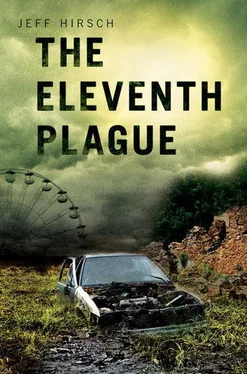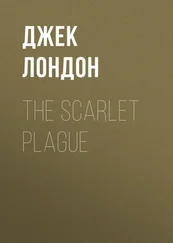I walked around the school, looking in the windows as I went. Inside there were empty classrooms filled with abandoned desks and chairs. I made it around to the back of the school, found a lone window, and peeked inside.
Desks and chairs sat in six neat rows far below. There was a kid at each desk, pencil in hand, leaning over a stack of papers and writing intently. The rows were broken up by age, the youngest in the front, oldest in the back. Jackson and his friends sat together toward the rear. Will Henry sat on the opposite side of the room behind them, dozing, surrounded by twins, two pale, greasy boys who reminded me of slugs, and a giant redheaded boy with a grove of acne covering his face.
All the rows faced a black chalkboard and a long wooden desk to my right. Sitting at the desk was a tall, thin man with steel-rimmed glasses, wearing a black suit that was a bit too tight and made him look like a scarecrow. He scanned the room, watching the quietly writing students.
“Freaky, huh?”
I whirled around, dropping my hand to the hilt of Dad’s knife.
Jenny Tan lounged against the big sycamore behind me, wearing a green army jacket with a red star on the sleeve. She had a large pad of paper spread on her lap and a line of colored pencils in the grass next to her.
“You gonna stab me with that thing, or what?”
Suddenly feeling foolish, I jerked my hand away from the knife.
“So,” she said. “You’re the spy.”
“I’m no spy,” I said. “We’re salvagers.”
“Salvagers,” she said, tilting her head against the tree trunk and studying me. “Never actually met one of you before. You travel around, right?” She nodded her head out toward the trees and the edge of town. “Out in the great beyond?”
I nodded. Jenny watched me a moment longer, then took a pencil off the ground and started drawing. She looked past me into the window of the school and then down again. I watched as she erased a line and redrew it, then smudged it with her thumb. Her eyebrows knitted together in concentration. Her hair, loose and tangled, framed her face like a deep shadow. I kept thinking of the hurricane she had been the night before, amazed at how she seemed like someone completely different now.
“How come you don’t go to school with the rest of them?” I asked.
“And listen to Tuttle go blah-blah-blah-blah about history and math and the poetry of English guys who have been dead for a thousand years? No thanks. Only reason anybody goes is because it’s what their parents remember doing when they were kids, so they’re doomed to repeat it.” Jenny looked up at me. Her eyes were deep brown and seemingly flecked with gold, like a hawk’s. “Sounds kind of dumb, huh?”
I shrugged. “Guess so.”
Jenny glanced down at my hand. “No dumber than reaching for a weapon every time you see a Chinese girl.”
She sprang it like a bear trap. I scrambled for something to say, but when I opened my mouth, no words came.
“What? Your folks tell you to expect horns and a tail or something?”
“No. I—”
Jenny’s grin grew wider, about to burst into a laugh. “Relax,” she said. “I’m just messing with you. Hey, I’d probably reach for a knife if I saw me too.”
A rumble came from inside the school. I turned to the window and saw the students were pushing back from their desks and stampeding toward the double doors at the back of the classroom.
“Uh-oh. Here comes the flood.” Jenny tore the drawing out of her pad, crumpled it up, and tossed it to the ground. As she stood up and stretched, her Red Army jacket lifted, revealing a scar that was thick as a trench and curled across her middle and around her back.
“I don’t know. Maybe I will go back to school on Monday,” she said, letting the statement hang in the air for a moment before turning and giving me a quick look. “It’s been a while since I annoyed Tuttle. Maybe I’ll see ya around, tough guy.”
Jenny gathered her things, then strode away on bare feet down the hill, just missing the torrent of bodies that roared into the playground outside the school. I turned to escape before they could reach me, stopping only to snatch Jenny’s crumpled drawing off the ground, then dashing into the forest.
I tromped through the brush, not looking where I was going, simply trying to escape the strangeness of the day. She was right — I had never actually seen a Chinese person up close before, let alone talked to one. These were the people the United States had been at war with? The people who’d released P11 and killed millions? After the plague had passed and the Chinese troops had invaded, there’d been years of vicious fights between them and the survivors. My family had fled San Diego a year before I was born, though, so we mostly kept out of it. Still, we couldn’t help but see the spreading aftermath.
Grandpa said the Chinese were subhuman. Savage, ugly, and vicious. But if that’s true, I wondered, how come when I look at Jenny, that’s not what I see?
I skimmed the edges of backyards as I went deeper into the woods. The neat lines of the houses were just visible through the trees, which were hanging over thick grass and vegetable patches. I thought again of the treasures Violet had laid out in that cabinet of hers. Drugs. Priceless medical instruments.
I wondered: How is it possible that while we had nothing, these people are here with all of this?
A twist of anger made me stop to catch my breath. The forest shifted around me in the wind. Something small skittered through dry leaves. Grandpa had told me a hundred times that life wasn’t fair and that expecting it to be was for fools.
These people got lucky. That’s all. It can’t last. All that matters is that I have to be ready when Dad gets better so we can get on track again. We need supplies and things to trade.
But what?
I searched and searched for an answer, only to return to the same place each time.
There was only one thing to do.
I didn’t like it, but the truth was we had never been in anywhere near this much trouble before and I was the only one who could save us.
A blackbird cawed loudly, startling me. The sun had dropped a couple degrees in the sky. I thought of Dad lying there all alone and started to go, but then I remembered Jenny’s drawing still clenched in my hand. I turned the crumpled ball over, and before I knew it, my fingers were pulling it open. The paper crackled as I spread it open on the ground in front of me.
It wasn’t what I expected at all. Inside was a nearly perfect sketch of the back of the school with the sky and drifting clouds in the background. The scrub and grass leading up to the brick wall were textured and deep. It all looked unbelievably real, like a photograph, except that on the other side of the window, instead of a class full of students, desks, and a teacher, there stood a lone, riderless horse.
Its head was bowed almost to the floor. It had no saddle or bridle, and its dark mane was long and tangled. The strangeness of it was overwhelming, but not in the same way that the town was. Looking at it made my pulse slow and my breathing run shallow and quiet for the first time since I’d arrived, like it was speaking to me in a language I could almost, but not quite, understand.
I traced the lines of the drawing with the tip of my finger, looping and slashing across the paper like Jenny had, trying to imagine what was in her head as she did it.
The blackbird cawed again, pulling me back into the world. Waste of time, I thought, and folded the paper up and shoved it in my pocket. I had no time to be looking at pictures.
I had work to do.
Late that night, once everyone had gone to sleep, I sat up in the darkness. I dressed as silently as I could, then gathered everything I needed — moving achingly slow to avoid making any sound — and crept out of town.
Читать дальше












